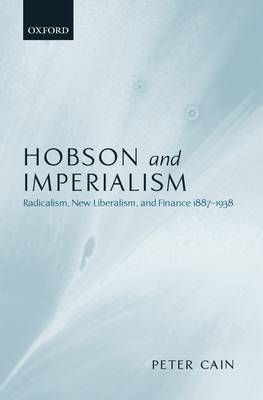
Bedankt voor het vertrouwen het afgelopen jaar! Om jou te bedanken bieden we GRATIS verzending (in België) aan op alles gedurende de hele maand januari.
- Afhalen na 1 uur in een winkel met voorraad
- In januari gratis thuislevering in België
- Ruim aanbod met 7 miljoen producten
Bedankt voor het vertrouwen het afgelopen jaar! Om jou te bedanken bieden we GRATIS verzending (in België) aan op alles gedurende de hele maand januari.
- Afhalen na 1 uur in een winkel met voorraad
- In januari gratis thuislevering in België
- Ruim aanbod met 7 miljoen producten
Zoeken
Hobson and Imperialism
Radicalism, New Liberalism and Finance, 1887-1938
Peter J Cain, P J Cain
Hardcover | Engels
€ 394,95
+ 789 punten
Omschrijving
The year 2002 sees the centenary of J.A. Hobson's Imperialism: A Study, the most influential critique of British imperial expansion ever written. Peter Cain marks the occasion by evaluating, for the first time, Hobson's writings on imperialism from his days as a journalist in London to his death in 1940. The early chapters chart Hobson's progress from complacent imperialist in the 1880s to radical critic of empire by 1898. This is followed by an account of the origins of Imperialism and a close analysis of the text in the context of contemporary debates. Two chapters cover Hobson's later writings, showing their richness and variety, and analysing his decision to republish Imperialism in 1938. The author discusses the reception of Imperialism and its emergence as a 'classic' by the late 1930s and ends with a detailed discussion of the relevance of the arguments of Imperialism to present-day historians.
Specificaties
Betrokkenen
- Auteur(s):
- Uitgeverij:
Inhoud
- Aantal bladzijden:
- 332
- Taal:
- Engels
Eigenschappen
- Productcode (EAN):
- 9780198203902
- Verschijningsdatum:
- 5/09/2002
- Uitvoering:
- Hardcover
- Formaat:
- Genaaid
- Afmetingen:
- 143 mm x 233 mm
- Gewicht:
- 530 g

Alleen bij Standaard Boekhandel
+ 789 punten op je klantenkaart van Standaard Boekhandel
Beoordelingen
We publiceren alleen reviews die voldoen aan de voorwaarden voor reviews. Bekijk onze voorwaarden voor reviews.









